Elizabeth Baigent (University of Oxford)
Elizabeth Baigent is Reader in the History of Geography at the University of Oxford. Her interest in Swedish mapping is part of a larger interest in how the history of cartography intersects with social, economic, and intellectual life. The main English language analysis of early modern Swedish geometrical mapping is in her Cadastral Map in the Service of the State (Chicago, 1992, with R.J.P. Kain, winner of the Nebenzahl prize in 1992), while her essay in Nationalutgåva av de äldre geometriska kartorna (Kungl. Vitterhets Historie och Antikvitets Akademien, 2003) considers the maps in international context. She is co-convenor of The Oxford Seminars in Cartography (founded 1992) and plans a major map exhibition and book in 2016 in Oxford in conjunction with the Bodleian Library.
« Back to Schedule
Philip Beeley (University of Oxford)
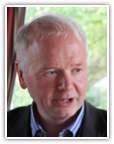 Philip Beeley is a Research Fellow with the Cultures of Knowledge Project, working on the correspondence of John Wallis. He has written extensively on early modern philosophy and the history of science, including a monograph on the young Leibniz, Kontinuität und Mechanismus (1996). He was for many years editor of Leibniz’s philosophical writings and correspondence for the Berlin Academy Edition, and is co-editor of the multi-volume Correspondence of John Wallis (OUP, 2003–). Before joining the Project, Philip worked as a researcher on the Oxford-based Wallis Project, producing editions of Wallis’s non-mathematical works, including his Treatise of Logick.
Philip Beeley is a Research Fellow with the Cultures of Knowledge Project, working on the correspondence of John Wallis. He has written extensively on early modern philosophy and the history of science, including a monograph on the young Leibniz, Kontinuität und Mechanismus (1996). He was for many years editor of Leibniz’s philosophical writings and correspondence for the Berlin Academy Edition, and is co-editor of the multi-volume Correspondence of John Wallis (OUP, 2003–). Before joining the Project, Philip worked as a researcher on the Oxford-based Wallis Project, producing editions of Wallis’s non-mathematical works, including his Treatise of Logick.
« Back to Schedule
Mark Brayshay (University of Plymouth)
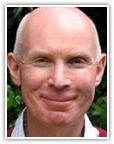 Mark Brayshay is professor of historical geography at the University of Plymouth. He has pursued a wide and eclectic range of themes within historical geography including, inter alia, emigration to Britain’s colonies, multinational business networks in the colonial era, model housing schemes, and the reconstruction of blitzed cities. However, his principal focus has been on travel and communications in the early modern era and, in particular, he has worked on the formation in England and Wales of posting services. He is currently completing a book on this subject for the University of Exeter Press.
Mark Brayshay is professor of historical geography at the University of Plymouth. He has pursued a wide and eclectic range of themes within historical geography including, inter alia, emigration to Britain’s colonies, multinational business networks in the colonial era, model housing schemes, and the reconstruction of blitzed cities. However, his principal focus has been on travel and communications in the early modern era and, in particular, he has worked on the formation in England and Wales of posting services. He is currently completing a book on this subject for the University of Exeter Press.
« Back to Schedule
Simon Burrows (University of Leeds)
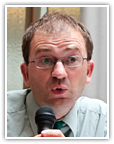 Simon Burrows is Professor of Modern European History at the University of Leeds and Principal investigator for the AHRC funded French Book Trade in Enlightenment Europe project. A graduate of the University of Oxford, he spent seven years in New Zealand prior to moving to Leeds in 2000. He is the author of French Exile Journalism and European Politics, 1792-1814 (2000), Blackmail, Scandal and Revolution: London’s French libellistes (2006) and A King’s Ransom (2010), a biography of the pamphleteer Théveneau de Morande. He has co-edited collections on the press in Europe and North America; cultural transfers; and the cross-dressing diplomat the Chevalier d’Eon. He and Mark Curran have worked together for 10 years: since 2007 they have been creating an innovative online database of the Société typographique de Neuchâtel’s publishing trade.
Simon Burrows is Professor of Modern European History at the University of Leeds and Principal investigator for the AHRC funded French Book Trade in Enlightenment Europe project. A graduate of the University of Oxford, he spent seven years in New Zealand prior to moving to Leeds in 2000. He is the author of French Exile Journalism and European Politics, 1792-1814 (2000), Blackmail, Scandal and Revolution: London’s French libellistes (2006) and A King’s Ransom (2010), a biography of the pamphleteer Théveneau de Morande. He has co-edited collections on the press in Europe and North America; cultural transfers; and the cross-dressing diplomat the Chevalier d’Eon. He and Mark Curran have worked together for 10 years: since 2007 they have been creating an innovative online database of the Société typographique de Neuchâtel’s publishing trade.
« Back to Schedule
Giovanna Ceserani (Stanford University)
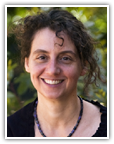 Giovanna Ceserani is an assistant professor of Classics at Stanford University and a faculty director of the Mapping the Republic of Letters Project. She is an intellectual historian working on the history of classical archaeology and the modern historiography of the ancient world, on which she has written many articles and the book Italy’s Lost Greece: Magna Graecia and the Making of Modern Archaeology (Oxford, 2011 [in press]). Her current research is on the early modern emergence of histories of ancient Greece in its European wide context and on the digital mapping of the eighteenth-century Grand Tour of Italy.
Giovanna Ceserani is an assistant professor of Classics at Stanford University and a faculty director of the Mapping the Republic of Letters Project. She is an intellectual historian working on the history of classical archaeology and the modern historiography of the ancient world, on which she has written many articles and the book Italy’s Lost Greece: Magna Graecia and the Making of Modern Archaeology (Oxford, 2011 [in press]). Her current research is on the early modern emergence of histories of ancient Greece in its European wide context and on the digital mapping of the eighteenth-century Grand Tour of Italy.
« Back to Schedule
Michal Choptiany (Jagiellonian University)
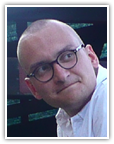 Michał Choptiany, Polish philologist and philosopher, is a PhD candidate at the Department of Old Polish Literature in the Faculty of Polish Studies of Jagiellonian University in Kraków. His dissertation is devoted to Petrus Ramus’s and Audomarus Talaeus’s rhetorical theory and its application and reception in the sixteenth- and seventeenth-century Polish-Lithuanian Commonwealth. He is a research and publications secretary of the Committee on the Study of Reformation in Poland and East-Central Europe at the Institute for Interdisciplinary Studies ‘Artes Liberales’ (University of Warsaw), a secretary of the board of the Polish Journal of Philosophy (Institute of Philosophy, Jagiellonian University) and Autopotret quarterly (Malopolska Institute of Culture in Kraków). He was awarded Sasakawa Young Leaders Fellowship Fund, Stanisław Estreicher, and Florentyna Kogutowska scholarships. In May 2010 he was a Junior Visiting Research Associate at the Modern European History Research Centre at the University of Oxford. His interests cover history of rhetoric, old Polish literature, early modern culture, history of ideas, history of Humanism and Reformation, and philosophy and theology.
Michał Choptiany, Polish philologist and philosopher, is a PhD candidate at the Department of Old Polish Literature in the Faculty of Polish Studies of Jagiellonian University in Kraków. His dissertation is devoted to Petrus Ramus’s and Audomarus Talaeus’s rhetorical theory and its application and reception in the sixteenth- and seventeenth-century Polish-Lithuanian Commonwealth. He is a research and publications secretary of the Committee on the Study of Reformation in Poland and East-Central Europe at the Institute for Interdisciplinary Studies ‘Artes Liberales’ (University of Warsaw), a secretary of the board of the Polish Journal of Philosophy (Institute of Philosophy, Jagiellonian University) and Autopotret quarterly (Malopolska Institute of Culture in Kraków). He was awarded Sasakawa Young Leaders Fellowship Fund, Stanisław Estreicher, and Florentyna Kogutowska scholarships. In May 2010 he was a Junior Visiting Research Associate at the Modern European History Research Centre at the University of Oxford. His interests cover history of rhetoric, old Polish literature, early modern culture, history of ideas, history of Humanism and Reformation, and philosophy and theology.
« Back to Schedule
Nicole Coleman (Stanford University)
Profile forthcoming.
« Back to Schedule
Cory Cotter (University of Virginia)
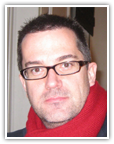 Educated in both the UK and the US, Dr Cotter holds a BA in Theological Historical Studies from Oral Roberts University, an MTh by Research in Ecclesiastical History from the University of Edinburgh, an MPhil in Theology and Religious Studies from the University of Cambridge, and a PhD in Early Modern European Intellectual History from the University of Virginia. His doctoral dissertation explored ‘Anglo-Dutch Dissent: British Dissenters in the Netherlands, 1662-1688’. Dr Cotter, a former Fulbright Fellow in the Netherlands and Scaliger Fellow at Leiden University, will present a paper on ‘The Intellectual Geography of the Restoration Diaspora’ during the 1660s, which maps out the subsequent movements of those ejected during the Restoration Settlement (1660-62).
Educated in both the UK and the US, Dr Cotter holds a BA in Theological Historical Studies from Oral Roberts University, an MTh by Research in Ecclesiastical History from the University of Edinburgh, an MPhil in Theology and Religious Studies from the University of Cambridge, and a PhD in Early Modern European Intellectual History from the University of Virginia. His doctoral dissertation explored ‘Anglo-Dutch Dissent: British Dissenters in the Netherlands, 1662-1688’. Dr Cotter, a former Fulbright Fellow in the Netherlands and Scaliger Fellow at Leiden University, will present a paper on ‘The Intellectual Geography of the Restoration Diaspora’ during the 1660s, which maps out the subsequent movements of those ejected during the Restoration Settlement (1660-62).
« Back to Schedule
Mark Curran (University of Leeds)
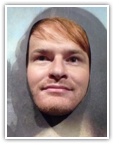 Dr Mark Curran, currently a Research Fellow in the School of History at the University of Leeds, will shortly be taking up the Munby fellowship in bibliography at the University of Cambridge. His debut academic article ‘Mettons toujours Londres’ was recently awarded the French History article prize, and his first book Atheism, Religion and Enlightenment in pre-Revolutionary Europe will be published by the Royal Historical Society later this year. Based in Neuchâtel, Switzerland, he is currently working on a monograph about the eighteenth-century French book trade that draws on data from the AHRC French Book Trade in Enlightenment Europe project. Aside from spending his days wrestling the purchases and sales of around 400,000 French books, he believes that all is for the best in the best of all possible worlds.
Dr Mark Curran, currently a Research Fellow in the School of History at the University of Leeds, will shortly be taking up the Munby fellowship in bibliography at the University of Cambridge. His debut academic article ‘Mettons toujours Londres’ was recently awarded the French History article prize, and his first book Atheism, Religion and Enlightenment in pre-Revolutionary Europe will be published by the Royal Historical Society later this year. Based in Neuchâtel, Switzerland, he is currently working on a monograph about the eighteenth-century French book trade that draws on data from the AHRC French Book Trade in Enlightenment Europe project. Aside from spending his days wrestling the purchases and sales of around 400,000 French books, he believes that all is for the best in the best of all possible worlds.
« Back to Schedule
Katherine East (Royal Holloway, University of London)
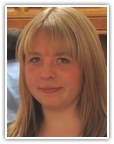 Katie East holds a BA from the University of Oxford and an MLitt from the University of St Andrews, and is currently in the second year of her AHRC funded PhD at Royal Holloway, working under the supervision of Professor Jonathan Powell and Professor Justin Champion. Her doctoral thesis is an examination of the treatise Cicero Illustratus, written by the radical John Toland in 1712, in which he proposes a new edition of the complete works of Cicero. This treatise engages with numerous elements of intellectual history and classical scholarship in the seventeenth and early eighteenth centuries, including textual scholarship and the value placed on Cicero in this period. In particular, the treatise acts as an example of the Republic of Letters in action, an aspect she intends to pursue further in her paper.
Katie East holds a BA from the University of Oxford and an MLitt from the University of St Andrews, and is currently in the second year of her AHRC funded PhD at Royal Holloway, working under the supervision of Professor Jonathan Powell and Professor Justin Champion. Her doctoral thesis is an examination of the treatise Cicero Illustratus, written by the radical John Toland in 1712, in which he proposes a new edition of the complete works of Cicero. This treatise engages with numerous elements of intellectual history and classical scholarship in the seventeenth and early eighteenth centuries, including textual scholarship and the value placed on Cicero in this period. In particular, the treatise acts as an example of the Republic of Letters in action, an aspect she intends to pursue further in her paper.
« Back to Schedule
Vittoria Feola (Medical University of Vienna)
Vittoria Feola is Lise Meitner Senior Postdoc at the Medical University of Vienna, where she lectures on both the history of early modern medicine and on the Republic of Letters. She is also Visiting Research Fellow at the Institute of English Studies, University of London. Her current research focusses on the role of the Imperial Library, Vienna, in the Republic of Letters of the second half of the seventeenth century. She holds a BA in Political Sciences (Rome), an MPhil and a PhD in History (Cambridge University). She has been the Francqui Postdoctoral Fellow at the Université Libre de Bruxelles, and Visiting Research Fellow at the Institut National d’Histoire de l’Art, Paris. This European background has something to do with her interests in knowledge exchanges in early modern Europe, a topic on which she is editing Antiquarianism and Science in Urban Networks, ca.1580-1700 (forthcoming with Brepols). Her intellectual biography of the Oxford antiquary Elias Ashmole, Elias Ashmole and the Uses of Antiquity, explores the relation of antiquarianism to science in seventeenth-century England (in the press).
« Back to Schedule
Charles van den Heuvel (Huygens Institute)
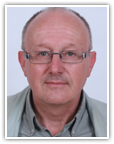 Charles van den Heuvel is Head of Research into the History of Science at the Huygens Institute for the History of the Netherlands of the Royal Netherlands Academy of Arts and Sciences. Furthermore, he forms part of the e-humanities research group of this academy, and is involved closely with Circulation of Knowledge and Learned Practices in the Seventeenth-Century Dutch Republi (CKCC). He studied Art History and Archaeology at Groningen University, where in 1991 he defended his PhD on the dissemination of technological knowledge and culture by Italian engineers in the Low Countries in the second half of the sixteenth century. Furthermore, he published a book on the Flemish mathematician Simon Stevin entitled De Huysbou: A Reconstruction of an Unfinished Treatise on Architecture, Town Planning and Civil Engineering by Simon Stevin, History of Science and Scholarship in the Netherlands 7 (Amsterdam: KNAW-Edita, 2005, 545 pp). He publishes regularly on history of architecture, fortification and town planning, the history of cartography, the history of science, and the history of information science. Themes of interest in the latter discipline are the history of classification, the history of the world wide web, and the history of the visualization of knowledge.
Charles van den Heuvel is Head of Research into the History of Science at the Huygens Institute for the History of the Netherlands of the Royal Netherlands Academy of Arts and Sciences. Furthermore, he forms part of the e-humanities research group of this academy, and is involved closely with Circulation of Knowledge and Learned Practices in the Seventeenth-Century Dutch Republi (CKCC). He studied Art History and Archaeology at Groningen University, where in 1991 he defended his PhD on the dissemination of technological knowledge and culture by Italian engineers in the Low Countries in the second half of the sixteenth century. Furthermore, he published a book on the Flemish mathematician Simon Stevin entitled De Huysbou: A Reconstruction of an Unfinished Treatise on Architecture, Town Planning and Civil Engineering by Simon Stevin, History of Science and Scholarship in the Netherlands 7 (Amsterdam: KNAW-Edita, 2005, 545 pp). He publishes regularly on history of architecture, fortification and town planning, the history of cartography, the history of science, and the history of information science. Themes of interest in the latter discipline are the history of classification, the history of the world wide web, and the history of the visualization of knowledge.
« Back to Schedule
Kat Hill (University of Oxford)
Kat Hill has recently completed a DPhil at Balliol College in Oxford, working on Anabaptism in central Germany in the sixteenth century, and is about to start a post-doctoral fellowship at Oriel College. Her research project is entitled The Developing Culture of Lutheranism: Publishing, Theology and Literature in the later Sixteenth Century. This project will examine how a coherent but broad Lutheran culture was created in the second half of the sixteenth century, a culture which Lutheran pastors and writers attempted to transmit across a range of genres to a wide public. This study will explore the memorialisation and diffusion of the Lutheran Reformation in the sixteenth century in theology and literature, images and music, addressing a deficiency in Germany’s cultural history.
« Back to Schedule
Howard Hotson (University of Oxford)
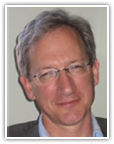 Howard Hotson, Professor of Early Modern Intellectual History, is organiser of the conference and Project Director of its umbrella initiative Cultures of Knowledge: An Intellectual Geography of the Seventeenth-Century Republic of Letters. He has published (inter alia) an intellectual biography of Comenius’s teacher, Johann Heinrich Alsted (OUP, 2000), and a survey of central European Reformed educational theory and practice (Commonplace Learning: Ramism and its German Ramifications, 1543–1630, OUP, 2007), both of which interrelate the histories of science, philosophy, religion, and education and ground them in concrete geographical contexts. He is currently completing a study of the international diaspora of Reformed intelligentsia during the Thirty Years War and editing the series on ‘Further Reformation and Universal Reform’ emerging from the Project’s 2001 conference.
Howard Hotson, Professor of Early Modern Intellectual History, is organiser of the conference and Project Director of its umbrella initiative Cultures of Knowledge: An Intellectual Geography of the Seventeenth-Century Republic of Letters. He has published (inter alia) an intellectual biography of Comenius’s teacher, Johann Heinrich Alsted (OUP, 2000), and a survey of central European Reformed educational theory and practice (Commonplace Learning: Ramism and its German Ramifications, 1543–1630, OUP, 2007), both of which interrelate the histories of science, philosophy, religion, and education and ground them in concrete geographical contexts. He is currently completing a study of the international diaspora of Reformed intelligentsia during the Thirty Years War and editing the series on ‘Further Reformation and Universal Reform’ emerging from the Project’s 2001 conference.
« Back to Schedule
Stephen Johnston (Museum of the History of Science, Oxford)
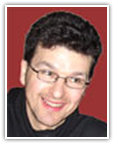 Stephen Johnston is Assistant Keeper at the Museum of the History of Science. His research and teaching focus on topics in the histories of science, technology and mathematics, particularly emphasising scientific instruments and museum collections. His publications range from practical mathematics in 16th-century England to 19th-century computing. He has curated a wide range of exhibitions in Oxford, from 18th-century astronomy to Islamic arts and sciences. His most recent book was Compass and Rule: Architecture as Mathematical Practice in England, 1500-1750, with Anthony Gerbino (Yale University Press, 2009).
Stephen Johnston is Assistant Keeper at the Museum of the History of Science. His research and teaching focus on topics in the histories of science, technology and mathematics, particularly emphasising scientific instruments and museum collections. His publications range from practical mathematics in 16th-century England to 19th-century computing. He has curated a wide range of exhibitions in Oxford, from 18th-century astronomy to Islamic arts and sciences. His most recent book was Compass and Rule: Architecture as Mathematical Practice in England, 1500-1750, with Anthony Gerbino (Yale University Press, 2009).
« Back to Schedule
Vera Keller (University of Oregon)
 Vera Keller is an assistant professor of history in the Clark Honors College at the University of Oregon. She is currently completing her first book, The Wish List: Collecting the Future in the Early Modern Past. The Wish List examines early modern lists of ancient, modern, and not-yet-discovered inventions, particularly as they appeared in the programs for scientific and political reform of Francis Bacon and Jakob Bornitz. A series of connected micro-histories, the Wish List traces how such techniques did and did not succeed in forming collaborative research agendas across Europe and through the seventeenth century. Keller’s interests include the transnational history of science, the history of the book, and the history of economic and political thought. She has also published on networks and the circulation of information, learned friendship and the album amicorum, and the artisan and philosopher Cornelis Drebbel.
Vera Keller is an assistant professor of history in the Clark Honors College at the University of Oregon. She is currently completing her first book, The Wish List: Collecting the Future in the Early Modern Past. The Wish List examines early modern lists of ancient, modern, and not-yet-discovered inventions, particularly as they appeared in the programs for scientific and political reform of Francis Bacon and Jakob Bornitz. A series of connected micro-histories, the Wish List traces how such techniques did and did not succeed in forming collaborative research agendas across Europe and through the seventeenth century. Keller’s interests include the transnational history of science, the history of the book, and the history of economic and political thought. She has also published on networks and the circulation of information, learned friendship and the album amicorum, and the artisan and philosopher Cornelis Drebbel.
« Back to Schedule
Magdalena Komorowska (Jagiellonian University)
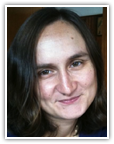 Magdalena Komorowska is a teaching and research fellow at the Department of Scholarly Editing and Auxiliary Sciences in the Faculty of Polish Studies of Jagiellonian University in Kraków. Her first book, discussing editorial problems in the writings of the renowned Polish preacher Piotr Skarga (1536–1612), will be published in December 2011. Currently she is a member of a team working on a critical edition of Skarga’s sermons. She is about to start a new research project pursuing the history of printing in Kraków in the late 16th and early 17th century. The research will focus mainly on the production of the print shop of Andrzej Piotrkowczyk (c.1550–1620). As well as scholarly editing and the history of the book, she is also interested in the theory and practice of translation.
Magdalena Komorowska is a teaching and research fellow at the Department of Scholarly Editing and Auxiliary Sciences in the Faculty of Polish Studies of Jagiellonian University in Kraków. Her first book, discussing editorial problems in the writings of the renowned Polish preacher Piotr Skarga (1536–1612), will be published in December 2011. Currently she is a member of a team working on a critical edition of Skarga’s sermons. She is about to start a new research project pursuing the history of printing in Kraków in the late 16th and early 17th century. The research will focus mainly on the production of the print shop of Andrzej Piotrkowczyk (c.1550–1620). As well as scholarly editing and the history of the book, she is also interested in the theory and practice of translation.
« Back to Schedule
Per Landgren (University of Gothenburg/University of Oxford)
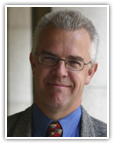 Per Landgren is a Postdoctoral Fellow of the Swedish Research Council, Senior Visiting Research Associate at The Modern European Research Center, and Visiting Scholar at Wolfson College in Oxford. Landgren took his licentiate in Latin 1991 and taught Latin at the University of Gothenburg in the early nineties, before embarking on a political career from 1992 to 2009 (including 8 years as an MP). In 2008, Landgren was awarded a doctorate in the History of Science and Ideas for a thesis entitled The Aristotelian Concept of History: Theory of History in Renaissance Europe and Sweden. Whilst in Oxford at the MEHRC (until September 2012), Landgren plans to expand his earlier research in theory of history of the late Renaissance. This will lead into new areas in early modern epistemology and the theory of science. Landgren’s research is also supported by the Royal Swedish Academy of Letters, the Åke Wiberg’s Foundation, The Lars Hierta Memorial Foundation, and the Magnus Bergvall Foundation.
Per Landgren is a Postdoctoral Fellow of the Swedish Research Council, Senior Visiting Research Associate at The Modern European Research Center, and Visiting Scholar at Wolfson College in Oxford. Landgren took his licentiate in Latin 1991 and taught Latin at the University of Gothenburg in the early nineties, before embarking on a political career from 1992 to 2009 (including 8 years as an MP). In 2008, Landgren was awarded a doctorate in the History of Science and Ideas for a thesis entitled The Aristotelian Concept of History: Theory of History in Renaissance Europe and Sweden. Whilst in Oxford at the MEHRC (until September 2012), Landgren plans to expand his earlier research in theory of history of the late Renaissance. This will lead into new areas in early modern epistemology and the theory of science. Landgren’s research is also supported by the Royal Swedish Academy of Letters, the Åke Wiberg’s Foundation, The Lars Hierta Memorial Foundation, and the Magnus Bergvall Foundation.
« Back to Schedule
Kim McLean-Fiander (University of Oxford)
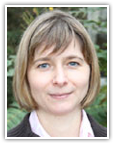 Currently an editor with the Cultures of Knowledge Project, Kim McLean-Fiander’s scholarship focuses on early modern women, their intellectual networks, and how they wrote their lives into the paratextual interstices of their works. Alongside her academic research, she has for several years worked for the Bodleian Libraries and as a freelance editor. During her 2009 internship with the Curator of Manuscripts at the Folger Shakespeare Library, she labelled and rehoused a wide range of fourteenth- to nineteenth-century documents from the Ferrers Family Papers and edited the associated online finding aid. She has a passion for rare books and manuscripts as social and material artefacts, and is currently interested in the development of digitization projects which will improve scholarly access to these resources while ensuring their ongoing preservation and conservation.
Currently an editor with the Cultures of Knowledge Project, Kim McLean-Fiander’s scholarship focuses on early modern women, their intellectual networks, and how they wrote their lives into the paratextual interstices of their works. Alongside her academic research, she has for several years worked for the Bodleian Libraries and as a freelance editor. During her 2009 internship with the Curator of Manuscripts at the Folger Shakespeare Library, she labelled and rehoused a wide range of fourteenth- to nineteenth-century documents from the Ferrers Family Papers and edited the associated online finding aid. She has a passion for rare books and manuscripts as social and material artefacts, and is currently interested in the development of digitization projects which will improve scholarly access to these resources while ensuring their ongoing preservation and conservation.
« Back to Schedule
Nausicaa Milani (University of Parma)
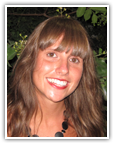 Nausicaa Elena Milani, currently a doctoral student in the history of modern philosophy at the University of Parma (Italy), is interested in French Cartesianism in the second half of the seventeenth and in the eighteenth century, with particular reference to Pierre Sylvain Régis’ interpretation of Descartes and its fortunes in European culture. Her first article has been published on Nuncius with the title ‘Il système di Régis e le sue immagini, tra nuova filosofia e censura’. She is going to publish a paper on the problem of subjectivity among the Cartesians, a work concerning the logic of Pierre Sylvain Régis’ Système and an article related to the cartesian method in Régis’ System of philosophy.
Nausicaa Elena Milani, currently a doctoral student in the history of modern philosophy at the University of Parma (Italy), is interested in French Cartesianism in the second half of the seventeenth and in the eighteenth century, with particular reference to Pierre Sylvain Régis’ interpretation of Descartes and its fortunes in European culture. Her first article has been published on Nuncius with the title ‘Il système di Régis e le sue immagini, tra nuova filosofia e censura’. She is going to publish a paper on the problem of subjectivity among the Cartesians, a work concerning the logic of Pierre Sylvain Régis’ Système and an article related to the cartesian method in Régis’ System of philosophy.
« Back to Schedule
Victor Morgan (University of East Anglia)
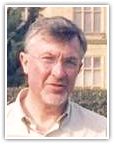 Sometime Harkness Fellow, Princeton; taught at Johns Hopkins University but has spent most of his career at UEA where at various times he was Director of the Centre of East Anglian Studies. Recently he was Leverhulme Research Fellow at the National Portrait Gallery. He has published on the history of cartography; the universities; the use of the royal prerogative; local government; patronage and clientage; provincial portraiture and artists; civic ‘memory’ and civic ritual; great houses. He is the joint editor of The Papers of Nathaniel Bacon of Stiffkey, 1566-1622, Volume V of which was published last year. He has an interest in the use of sociology and anthropology by historians and in the use of IT in the humanities. Current projects include an article on the material culture of Reformation in the diocese of Norwich; another on Norfolk Skies c.1600; a book on fame in the renaissance; another on civic ritual in Norwich, Renaissance to Enlightenment; and in his spare time the completion of the remaining three volumes of the Bacon Papers.
Sometime Harkness Fellow, Princeton; taught at Johns Hopkins University but has spent most of his career at UEA where at various times he was Director of the Centre of East Anglian Studies. Recently he was Leverhulme Research Fellow at the National Portrait Gallery. He has published on the history of cartography; the universities; the use of the royal prerogative; local government; patronage and clientage; provincial portraiture and artists; civic ‘memory’ and civic ritual; great houses. He is the joint editor of The Papers of Nathaniel Bacon of Stiffkey, 1566-1622, Volume V of which was published last year. He has an interest in the use of sociology and anthropology by historians and in the use of IT in the humanities. Current projects include an article on the material culture of Reformation in the diocese of Norwich; another on Norfolk Skies c.1600; a book on fame in the renaissance; another on civic ritual in Norwich, Renaissance to Enlightenment; and in his spare time the completion of the remaining three volumes of the Bacon Papers.
« Back to Schedule
Miles Ogborn (Queen Mary, University of London)
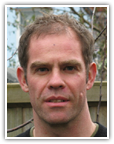 Miles Ogborn is Professor of Geography at Queen Mary, University of London and Co-director of the Centre for Eighteenth-Century Studies. He is an historical geographer whose current work focuses on networks of communication in the history of early modern trade and empire. He is the author of Spaces of Modernity: London’s Geographies, 1680-1780 (New York, 1998), Indian Ink: Script and Print in the Making of the English East India Company (Chicago, 2007), Global Lives: Britain and the World, 1550-1800 (Cambridge, 2008), and (edited with Charles W.J. Withers) Geographies of the Book (Farnham, 2010). He is currently working on the relationships between talk and text in the early modern Anglophone Caribbean.
Miles Ogborn is Professor of Geography at Queen Mary, University of London and Co-director of the Centre for Eighteenth-Century Studies. He is an historical geographer whose current work focuses on networks of communication in the history of early modern trade and empire. He is the author of Spaces of Modernity: London’s Geographies, 1680-1780 (New York, 1998), Indian Ink: Script and Print in the Making of the English East India Company (Chicago, 2007), Global Lives: Britain and the World, 1550-1800 (Cambridge, 2008), and (edited with Charles W.J. Withers) Geographies of the Book (Farnham, 2010). He is currently working on the relationships between talk and text in the early modern Anglophone Caribbean.
« Back to Schedule
Carol Pal (Bennington College)
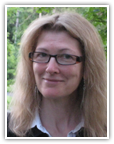 Carol Pal is an Assistant Professor of History at Bennington College. She received her PhD in 2007 from Stanford University, where her dissertation won the Elizabeth Spilman Rosenfield Dissertation Prize. Her first book, Republic of Women: Rethinking the Republic of Letters in the Seventeenth Century, is forthcoming from Cambridge University Press. It analyzes a transnational network of female scholars, and considers that case study as part of a larger methodological argument for a more practice-based approach to early modern intellectual history. She is also the co-editor of a sourcebook in the history of medicine, which will be published by Pearson in 2012. Her next project, entitled Transient Technologies, explores some of the lost practices of early modern knowledge-making. The focus of her current research is a reconsideration of the history of the book, with special emphasis on the correspondence and editorial practices of Samuel Hartlib.
Carol Pal is an Assistant Professor of History at Bennington College. She received her PhD in 2007 from Stanford University, where her dissertation won the Elizabeth Spilman Rosenfield Dissertation Prize. Her first book, Republic of Women: Rethinking the Republic of Letters in the Seventeenth Century, is forthcoming from Cambridge University Press. It analyzes a transnational network of female scholars, and considers that case study as part of a larger methodological argument for a more practice-based approach to early modern intellectual history. She is also the co-editor of a sourcebook in the history of medicine, which will be published by Pearson in 2012. Her next project, entitled Transient Technologies, explores some of the lost practices of early modern knowledge-making. The focus of her current research is a reconsideration of the history of the book, with special emphasis on the correspondence and editorial practices of Samuel Hartlib.
« Back to Schedule
Leigh Penman (University of Oxford)
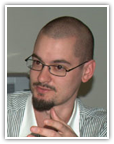 Leigh Penman is a Postdoctoral Fellow with the Cultures of Knowledge Project, working on the correspondence of Samuel Hartlib. He graduated with degrees in arts and law from the University of Melbourne. His doctoral thesis, concerning millenarian thought in early seventeenth-century Germany, was undertaken at Melbourne in association with the former Max-Planck-Institut für Geschichte in Göttingen. He is the author of the forthcoming monograph Unanticipated Millenniums: The Lutheran Experience of Chiliastic Thought, 1600–1630 (Springer), as well as more than a dozen articles on aspects of early modern history. His current research interests encompass imagined and virtual communities in seventeenth-century Europe, the network surrounding the Lusatian philosopher Jacob Böhme (d.1624), and the instrumentalisation of early modern historical events in modern popular and political culture.
Leigh Penman is a Postdoctoral Fellow with the Cultures of Knowledge Project, working on the correspondence of Samuel Hartlib. He graduated with degrees in arts and law from the University of Melbourne. His doctoral thesis, concerning millenarian thought in early seventeenth-century Germany, was undertaken at Melbourne in association with the former Max-Planck-Institut für Geschichte in Göttingen. He is the author of the forthcoming monograph Unanticipated Millenniums: The Lutheran Experience of Chiliastic Thought, 1600–1630 (Springer), as well as more than a dozen articles on aspects of early modern history. His current research interests encompass imagined and virtual communities in seventeenth-century Europe, the network surrounding the Lusatian philosopher Jacob Böhme (d.1624), and the instrumentalisation of early modern historical events in modern popular and political culture.
« Back to Schedule
Tamson Pietsch (Brunel University)
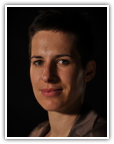 Tamson Pietsch is Lecturer in Imperial and Colonial History at Brunel University in London and an Associate Member of the History Faculty at the University of Oxford. Her research interests encompass the cultural and intellectual history of Britain and its Empire during the nineteenth and twentieth centuries. Specifically her work focuses on the ways that imperial and transnational forces shaped the production of culture and ideas in universities across the settler world. Tamson has published in the Journal of Global History, the Journal of Historical Geography and History of Education and her first book, Universities and Empire: Academic Networks and the British World, 1850-1939, will appear with Manchester University Press in 2012. Previously Tamson was Sir Christopher Cox Junior Fellow at New College, Oxford.
Tamson Pietsch is Lecturer in Imperial and Colonial History at Brunel University in London and an Associate Member of the History Faculty at the University of Oxford. Her research interests encompass the cultural and intellectual history of Britain and its Empire during the nineteenth and twentieth centuries. Specifically her work focuses on the ways that imperial and transnational forces shaped the production of culture and ideas in universities across the settler world. Tamson has published in the Journal of Global History, the Journal of Historical Geography and History of Education and her first book, Universities and Empire: Academic Networks and the British World, 1850-1939, will appear with Manchester University Press in 2012. Previously Tamson was Sir Christopher Cox Junior Fellow at New College, Oxford.
« Back to Schedule
Anna Marie Roos (University of Oxford)
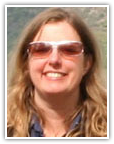 Anna Marie Roos is a Research Fellow with the Cultures of Knowledge Project, working on the correspondence of Martin Lister. Previously, she was an associate professor of history at the University of Minnesota. Her third monograph, an intellectual biography of Martin Lister, will be published by Brill in August 2011. Entitled Web of Nature: Martin Lister (1639–1712), the First Arachnologist, the book has received funding from the British Academy, the Royal Society, and the National Science Foundation. She is currently researching Lister’s ‘chymical’ experiments with antimony which influenced the work of Sir Isaac Newton.
Anna Marie Roos is a Research Fellow with the Cultures of Knowledge Project, working on the correspondence of Martin Lister. Previously, she was an associate professor of history at the University of Minnesota. Her third monograph, an intellectual biography of Martin Lister, will be published by Brill in August 2011. Entitled Web of Nature: Martin Lister (1639–1712), the First Arachnologist, the book has received funding from the British Academy, the Royal Society, and the National Science Foundation. She is currently researching Lister’s ‘chymical’ experiments with antimony which influenced the work of Sir Isaac Newton.
« Back to Schedule
Olaf Simons (Forschungszentrum Gotha)
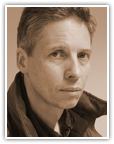 Olaf Simons studied German and English literatures and philosophy at the universities of Munich and Canterbury. He was awarded his PhD in 1998 for a thesis on the market for fiction in early modern Europe. Between 1999 and 2002 he served as co-author of the report on Bertelsmann’s role as a publisher in Nazi Germany, while from 2006-2009 he was lecturer in the faculty of English at the Carl von Ossietzky University of Oldenburg. He currently holds a research grant at the Forschungszentrum Gotha for a project on the history of the book market and the concept of literature in early modern Europe. Alongside his conventional academic pursuits, he is closely involved with the activities of the web-based, collaborative encylopaedia project Wikipedia.
Olaf Simons studied German and English literatures and philosophy at the universities of Munich and Canterbury. He was awarded his PhD in 1998 for a thesis on the market for fiction in early modern Europe. Between 1999 and 2002 he served as co-author of the report on Bertelsmann’s role as a publisher in Nazi Germany, while from 2006-2009 he was lecturer in the faculty of English at the Carl von Ossietzky University of Oldenburg. He currently holds a research grant at the Forschungszentrum Gotha for a project on the history of the book market and the concept of literature in early modern Europe. Alongside his conventional academic pursuits, he is closely involved with the activities of the web-based, collaborative encylopaedia project Wikipedia.




